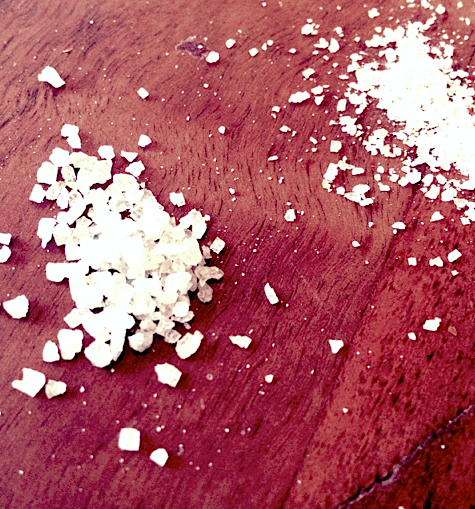
Monk Fruit: A Healthy Alternative to Sugar
In the world of natural sweeteners, one fruit stands out

Kick-start, energise, rejuvenate
All carefully planned and prepared to help nourish, reset and rejuvenate the body and mind.

Salt has been used for centuries and even called as “essential” for life, but also we have been encouraged to eat less salt.
The theory that salt cause high blood pressure is based on a few things.
When you eat salt your body retains water to maintain a stable sodium concentration. When your kidney works to eliminate salt and water there is a temporary increase in blood pressure. The question here is whether this will lead to chronic problems. No solid study has been done to prove this.
There was a test done on rats, that developed hypertension on a high-salt diet. However these rats are fed 60 times more salt than what the average westerners consumed.
In 1997, the DASH- Sodium Study was conducted. It consists largely fresh vegetables and fruits, lean protein, whole grains and low fat dairy and very low salt. Those people who were on this diet have shown reduced hypertension. But it was not only salt that they were consuming less of. This diet was also low in refined and processed foods, including sugar/fructose.
So these studies seem to have some holes and there are some more studies which concluded that “there is little evidence for long term benefit from reducing salt intake” (2003 Cochrane Collaboration, 2007 Rotterdam study : Eur J Epidemiol, 2011 AJH Meta- analysis)
While everyone was advocating low salt diet to improve blood pressure and heart health despite of lack of evidence, we have started seeing some proving otherwise.
In 2008 Italian researchers have done a series of short term clinical trials, all of which reported that, among patients with heart failure, reducing salt consumption increased the risk of death. These studies were done by people who had Type 1 and 2 diabetics, patients with chronic heart failure and also healthy Europeans. Those that ate salt at the lower limit of the normal range were more likely to have heart disease than those who ate salt in the middle range of normal.
In 2011, a study concluded that “Systolic blood pressure, but not diastolic pressure, changes over time aligned with change in sodium excretion, but this association did NOT translate into a higher risk of hypertension or cardiovascular disease complications. Lower sodium excretion was associated with higher cardiovascular disease mortality.” After following 3681 middle aged healthy Europeans for 8 years. These participants were divided into three groups. low, moderate and high salt intakes. After the study the risk for heart disease was 56 percent higher for the low salt group than for the group with high salt intake.
These tests are not easy to conduct. We cannot control their general lifestyle and other essential factors which may have contributed the final result. I just wanted to include these to show there are no clear studies done to prove that salt is “bad”
In an article in Newswise Dian Griesel, ph.D and Tom Griesel have stated regarding salt consumption “salt consumption does not seem to have the same effect on everyone. In addition, there is usually no distinction on the type of salt used. There are many naturally harvested salts that also contain many trace minerals, which undoubtedly have an effect. Medical literature on salt consumption (like many other things) is inconsistent.”
I agree. there are definitely NOT equal.
NATURAL SALT VS PROCESSED SALT
Natural salt has about 84 percent sodium chloride, 16 percent trace minerals. These minerals include selenium, which helps to chelate toxic heavy metals from the body, boron to help prevent osteoporosis. Safe copper which can help the body to form new arteries when the main arteries become too clogged and chromium which regulates blood sugar levels.
Processed salt has about 97.5 percent sodium chloride, 2.5 percent man made chemicals. These may include moisture absorbents, flow agents, ferrocyanide, aluminosilicate, talc, and fluoride. There is no trace minerals which are suppose to help to balance the blood pressure, which I wonder could have led to increase on blood pressure in some studies. The processing and high temperature alters the structure of the salt also.
in Average 75 percent of sodium in one’s diet comes form processed foods. Those sodium is more likely to be processed salt than natural salt.
Natural salt is important for many biological processes and essential for life
benefit
– maintain and help regulate blood pressure
– support the function of adrenal glands – vital for healthy hormone production
-support brain and muscle communication
– carry nutrients into and out of the cells
– essential for brain and neurons
There are many natural salts to choose from. celtic salt, macrobiotic salt, Himalayan pink salt etc.
One that I absolutely love at the moment is bamboo salt (grain or powder) . It has a distinct flavour, hint of egg (!). the benefits reported have been pretty amazing. Treating gastritis and other stomach conditions, blood sugar and blood pressure conditions to heart diseases. It is also known to eliminate an oxygen free radical and powerful anti-oxidant that helps with cell renewal.
see this separate post about benefits and what bamboo salt are all about here
you can find out the bamboo salt here
POTASSIUM AND SODIUM BALANCE
Another important thing to mention is the potassium and sodium balance
when we have too much sodium and too little potassium it can lead to many diseases such as heart diseases, memory decline, osteroporpsis, kidney stones, cataracts, rheumatoid arthritis, ulcers and cancer. Potassium helps to maintain proper PH levels and electrolyte balance in the body fluids and plays an important role in regulating your blood pressure. Again it is easy to cause imbalance when you are eating lots of processed foods which usually have high sodium and low potassium ratio.
Potassium is found in many natural whole foods, including fresh vegetables, beans and fruits.
Personally I have no reasons to avoid or have low-sodium diet at the moment. Salty flavour is an important part of creating enjoyable meal and balance. But be mindful with the quality and quantity. When you are using fresh produce what you want to taste is the ingredients themselves. Salt can accentuate the various flavours but should never be the main focus.

In the world of natural sweeteners, one fruit stands out

Maintaining stable blood sugar levels is crucial for overall health

In the intricate symphony of human emotions, our brains orchestrate
Copyright Shoku Iku © 2024 | All Rights Reserved.
The statements on this website have not been evaluated by the TGA or FDA. These products are not intended to diagnose, treat, cure or prevent any disease.